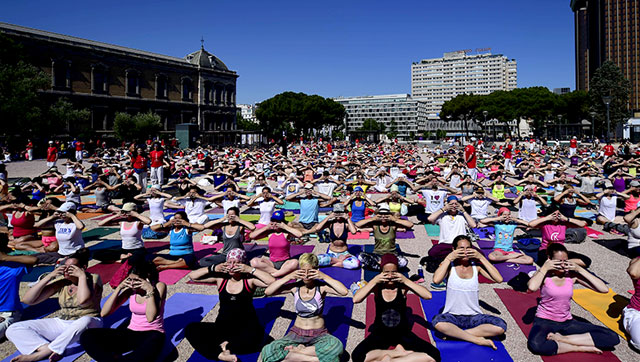 |
India's
soft power? Cultural nationalism? Or Hindutva push? The many
views on Yoga Day
 External
affairs minister Sushma Swaraj has said the United Nation's
decision to commemorate the International Day of Yoga underlines
an appreciation for India and its growing soft power. External
affairs minister Sushma Swaraj has said the United Nation's
decision to commemorate the International Day of Yoga underlines
an appreciation for India and its growing soft power.
The
way the event was celebrated around the globe showed "the
world had made the first International Day of Yoga its own",
Swaraj said at the Hindu Temple Society of North America on
Sunday.
June
21 was declared the International Day of Yoga by the UN last
December after Prime Minister Narendra Modi proposed the idea
during his first address to the world body?s General Assembly
three months earlier.
The
proposal was co-sponsored by 177 of the 193 members of the
UN, creating a record for the highest number of co-sponsoring
countries for an General Assembly resolution of such nature.
Modi
personally led nearly 36,000 people in performing asanas at
Delhi?s Rajpath, an event that set two new world records.
Read:
PM
Modi refuses selfies on Yoga Day
While
yoga is one of India's most important gifts to the world,
the UN's decision to celebrate the day is an appreciation
of India?s soft power, Swaraj said.
The
colour of the skin, religious or political affiliation and
nationality did not matter for hundreds of thousands who performed
yoga, she said. "They were all united by the awareness
of the power of yoga," she added.
Swaraj
cited the benefits of yoga in treating asthma, diabetes, drug
addiction and heart disease. ?Yoga is about self discovery
and self acceptance," she said.
Though
BJP leaders have reiterated yoga does not belong to any religion
and nation, there has been a raging debate on Yoga Day.
In
India, some Muslims groups opposed the event ? the 'surya
namskar?, a set of 12 asanas that is a salutation to the sun,
had to be dropped altogether ? and many Christian religious
leaders objected to the celebrations being held on a Sunday.
Congress
general secretary Digvijaya Singh said the event was only
aimed at burnishing Modi?s image. He tweeted on Sunday: ?I
wish International Yoga Day to all. But this Tamasha of Community
Yoga is utter waste of public money and is only image building
for Modi.?
Read:
How
Modi is elbowing Sonia, Rahul, Congress from India's cultural
memes
Assam
chief minister Tarun Gogoi, another senior leader of the Congress,
said the controversy had erupted because it was linked with
the Prime Minister?s politics.
"Yoga
is universally accepted, but unfortunately mired in controversy
because it has been inextricably linked up with Modi politics,"
Gogoi tweeted.
In
a series of tweets, he said yoga, like ?all other forms of
physical exercises", is good for health.
"However,
my priority is providing nutritious food, medical care, housing,
sanitation, drinking water and employment opportunities,"
Gogoi said.
Attacking
the NDA government, CPI-M general secretary Sitaram Yechury
said the mass mobilisation by the BJP-led government to celebrate
Yoga Day was an attempt to promote a Hindutva agenda at the
cost of India's secular and democratic fabric.
Claiming
that yoga was misused through a mega marketing exercise, the
Rajya Sabha MP said holding such large sessions was an attempt
to propel the Hindutva agenda in a country known for its diversity.
"Such
mass mobilisation for yoga sessions is a tactic similar to
that adopted by dictators in the past. Through such exercise,
attention is diverted from basic issues confronting people,"
Yechury said at an event in Bhubaneswar marking the birth
anniversary of Communist ideologue Harkishan Singh Surjeet.
Read:
35,985
participants, 84 nationalities: Yoga Day event at Rajpath
sets 2 Guinness records
Yechury
said all public gatherings at Delhi's Rajpath had been banned
since the demolition of the Babri masjid but the mega yoga
session was held on Sunday.
Yechury
also courted controversy when he cited the example of a dog
and said that when the animal gets up, it stretches its front
and rear legs and takes a deep breath. "All yoga exercises
can be noticed in dog's body movement," he said.
On
Yoga Day, BJP patriarch LK Advani highlighted the cultural
nationalism invoked by the BJP in the late 1980s, which catapulted
the party from two to 86 seats in Parliament, and said it
had started gaining ground and its impact is clearly visible.
Speaking
at Palampur in Himachal Pradesh, Advani recalled how the BJP
national executive at its meeting in 1989 passed a resolution
in favour of the Ram temple at Ayodhya and sticking to cultural
nationalism.
The
former deputy prime minister said the situation has taken
"a turn and today Prime Minister Narendra Modi is leading
a BJP majority government at the Centre".
Source
HT
Prabuddha
Bharata>>>
Vedanta
Kesari>>>
Vedanta
Mass Media>>>
|
